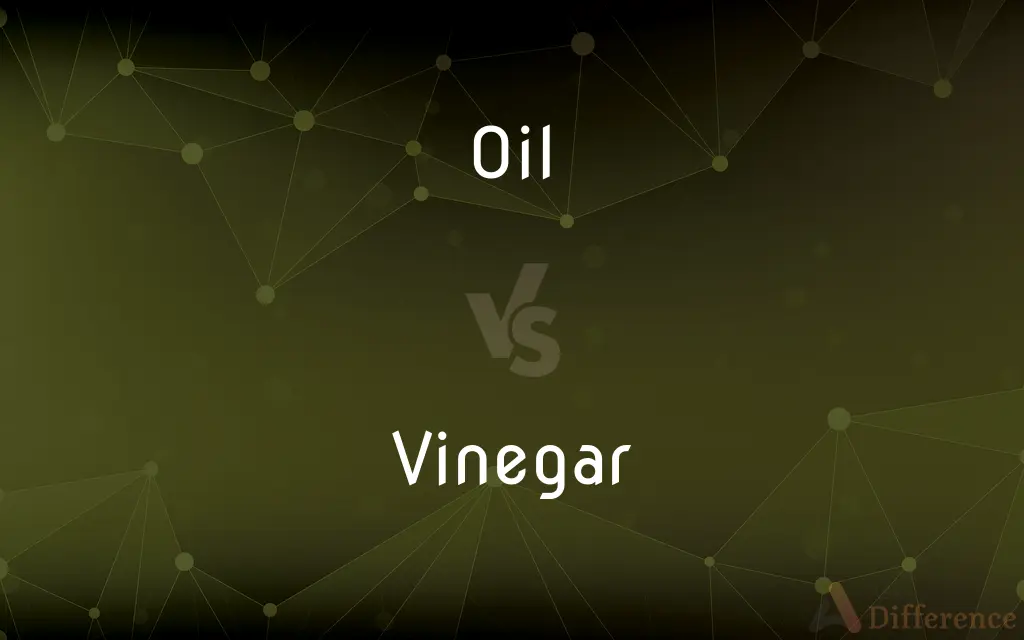Oil vs. Vinegar — What's the Difference?
By Tayyaba Rehman — Updated on October 28, 2023
Oil is a fatty, viscous liquid often used in cooking, while vinegar is an acidic liquid used for flavoring and preserving food.

Difference Between Oil and Vinegar
Table of Contents
ADVERTISEMENT
Key Differences
Oil is extracted from various sources like seeds, nuts, and fruits, primarily used for cooking, lubrication, and in cosmetics. Vinegar, an acidic substance, is made through the fermentation of ethanol, commonly used for flavoring and preserving food.
Oils are hydrophobic, not mixing with water, and have a high-fat content. Vinegars are aqueous solutions, containing acetic acid, and are water-soluble.
In cooking, oil is often used for frying, sautéing, and dressing salads. Vinegar, with its distinct sour taste, is used as a condiment, in pickling, and to add acidity to dishes.
The production of oil involves pressing and extraction processes, while vinegar is produced through fermentation of alcoholic liquids like wine or cider.
Oils vary greatly, including olive, canola, and coconut oil, each with distinct flavors and uses. Vinegars also come in various types, such as apple cider, balsamic, and white vinegar, each lending a unique taste to dishes.
ADVERTISEMENT
Comparison Chart
Composition
Fatty, viscous liquid
Acidic, aqueous solution
Uses
Cooking, lubrication, cosmetics
Flavoring, preserving food
Solubility
Hydrophobic, doesn't mix with water
Water-soluble
Production
Pressing, extraction from sources
Fermentation of ethanol
Types and Flavors
Olive, canola, coconut, etc.
Apple cider, balsamic, white, etc.
Compare with Definitions
Oil
Used in skincare and haircare.
Coconut oil is great for moisturizing skin.
Vinegar
An eco-friendly cleaning solution.
Vinegar can remove hard water stains.
Oil
A base for oil paints.
The artist preferred oil for her paintings.
Vinegar
Used in folk remedies and health tonics.
Apple cider vinegar is touted for its health benefits.
Oil
An oil is any nonpolar chemical substance that is a viscous liquid at ambient temperatures and is both hydrophobic (does not mix with water, literally "water fearing") and lipophilic (mixes with other oils, literally "fat loving"). Oils have a high carbon and hydrogen content and are usually flammable and surface active.
Vinegar
Employed in pickling and canning.
She made pickles using white vinegar.
Oil
A viscous liquid derived from petroleum, especially for use as a fuel or lubricant.
Vinegar
A key ingredient in salad dressings.
She whisked together oil and vinegar for the dressing.
Oil
Oil paint
A portrait in oils
Vinegar
Used to add sourness to dishes.
He splashed vinegar on his fish and chips.
Oil
Information or facts
Young had some good oil on the Adelaide races
Vinegar
Vinegar is an aqueous solution of acetic acid and trace compounds that may include flavorings. Vinegar typically contains 5–8% acetic acid by volume.
Oil
Lubricate, coat, or impregnate with oil
A lightly oiled baking tray
Vinegar
A sour liquid containing acetic acid, produced by fermenting a solution (such as wine or fermented rice) containing ethanol produced by a previous fermentation, used as a condiment and preservative.
Oil
Supply with oil as fuel
Attempts should not be made to oil individual tanks too rapidly
Vinegar
Sourness of speech or mood; ill temper.
Oil
Any of numerous mineral, vegetable, or synthetic substances or animal or vegetable fats that are generally slippery, combustible, viscous, liquid or liquefiable at room temperatures, soluble in various organic solvents such as ether but not in water, and used in a great variety of products, especially lubricants and fuels.
Vinegar
Liveliness and enthusiasm; vim.
Oil
Petroleum.
Vinegar
(uncountable) A sour liquid formed by the fermentation of alcohol used as a condiment or preservative; a dilute solution of acetic acid.
Oil
A petroleum derivative, such as a machine oil or lubricant.
Vinegar
(countable) Any variety of vinegar.
A range of herb-flavoured vinegars
Oil
A protective or cosmetic liquid applied to the skin or hair.
Vinegar
(transitive) To season or otherwise treat with vinegar.
Oil
Oil paint.
Vinegar
A sour liquid used as a condiment, or as a preservative, and obtained by the spontaneous (acetous) fermentation, or by the artificial oxidation, of wine, cider, beer, or the like.
Oil
A painting done in oil paint.
Vinegar
Hence, anything sour; - used also metaphorically.
Here's the challenge: . . . I warrant there's vinegar and pepper in't.
Oil
To lubricate, supply, cover, or polish with oil.
Vinegar
To convert into vinegar; to make like vinegar; to render sour or sharp.
Hoping that he hath vinegared his sensesAs he was bid.
Oil
Liquid fat.
Vinegar
Sour-tasting liquid produced usually by oxidation of the alcohol in wine or cider and used as a condiment or food preservative
Oil
Petroleum-based liquid used as fuel or lubricant.
Vinegar
Dilute acetic acid
Oil
Petroleum
Oil
(countable) An oil painting.
Oil
(painting) Oil paint.
I prefer to paint in oil
Oil
(attributive) Containing oil, conveying oil; intended for or capable of containing oil.
Oil barrel; oil pipe
Oil
(transitive) To lubricate with oil.
Oil
(transitive) To grease with oil for cooking.
Oil
Any one of a great variety of unctuous combustible substances, more viscous than and not miscible with water; as, olive oil, whale oil, rock oil, etc. They are of animal, vegetable, or mineral origin and of varied composition, and they are variously used for food, for solvents, for anointing, lubrication, illumination, etc. By extension, any substance of an oily consistency; as, oil of vitriol.
Oil
To smear or rub over with oil; to lubricate with oil; to anoint with oil.
Oil
A slippery or viscous liquid or liquefiable substance not miscible with water
Oil
Oil paint used by an artist
Oil
Any of a group of liquid edible fats that are obtained from plants
Oil
Cover with oil, as if by rubbing;
Oil the wooden surface
Oil
Administer an oil or ointment to ; often in a religious ceremony of blessing
Oil
A fatty liquid used in culinary preparations.
She drizzled olive oil over the salad.
Oil
A substance used to reduce friction.
He applied oil to the squeaky hinge.
Oil
Burned for energy or heat.
The lamp was fueled by kerosene oil.
Common Curiosities
Can oil be used as a salad dressing alone?
Yes, but it's often combined with vinegar for flavor.
Are all vinegars acidic?
Yes, they contain acetic acid.
Is vinegar good for health?
In moderation, it can have health benefits, especially apple cider vinegar.
Can oil and vinegar mix together?
They naturally separate due to oil's hydrophobic nature.
Is oil a good source of fat?
Yes, especially unsaturated fats in oils like olive and canola.
Can vinegar help in cleaning?
Yes, it's a natural cleaning agent.
Are there flavored oils?
Yes, like truffle or garlic-infused oils.
Are there different grades of olive oil?
Yes, including extra virgin, virgin, and light.
Can oil be used for high-heat cooking?
Some oils, like avocado and canola, are suitable for high heat.
Can vinegar be used in marinades?
Absolutely, it helps tenderize and flavor meats.
Does vinegar have a long shelf life?
Yes, vinegar has an almost indefinite shelf life.
Is vinegar used in baking?
Occasionally, to add acidity or react with baking soda.
Can vinegar spoil?
It's very unlikely due to its acidity.
Is oil high in calories?
Yes, oils are calorie-dense.
Is coconut oil healthy?
It's popular but should be used in moderation due to saturated fats.
Share Your Discovery

Previous Comparison
Fill vs. Full
Next Comparison
Amanuensis vs. ScribeAuthor Spotlight
Written by
Tayyaba RehmanTayyaba Rehman is a distinguished writer, currently serving as a primary contributor to askdifference.com. As a researcher in semantics and etymology, Tayyaba's passion for the complexity of languages and their distinctions has found a perfect home on the platform. Tayyaba delves into the intricacies of language, distinguishing between commonly confused words and phrases, thereby providing clarity for readers worldwide.














































